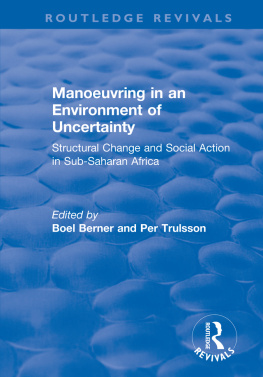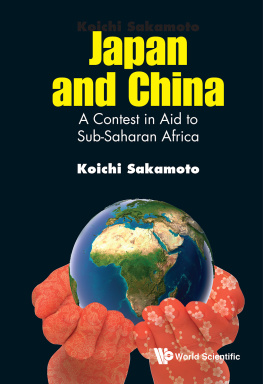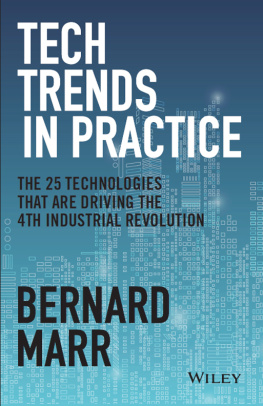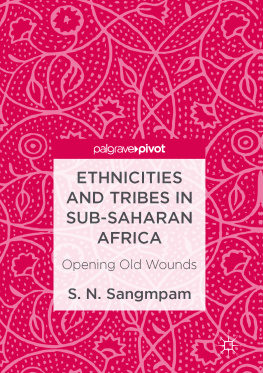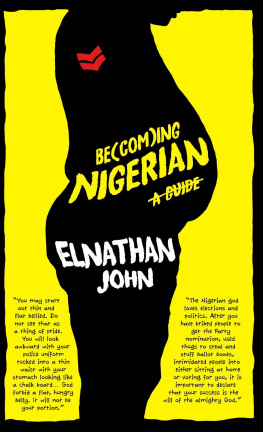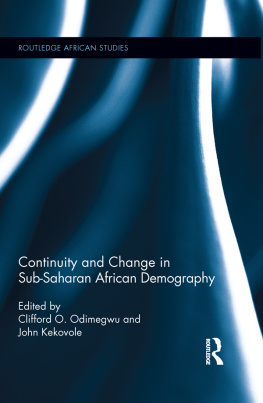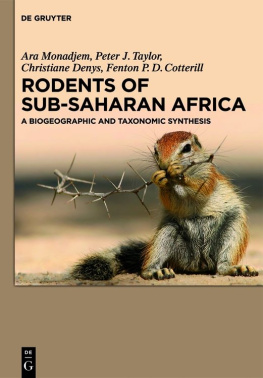TECHNOLOGY AND THE ENVIRONMENT IN SUB-SAHARAN AFRICA
.... to my bosom friend and wife, Adetola Ibidunni
An earlier version of this book is a Ph.D. dissertation at the Faculty of Economics and Business Administration, Maastricht University, The Netherlands, under the title, Technology Investment in Pollution Control in Sub-Saharan Africa: The Case of the Nigerian Manufacturing Industry.
The following institutions sponsored the research that gave rise to this book:
United Nations University/Institute for New Technologies (UNU/INTECH)
Keizer Karelplein 19
6211 TC Maastricht
The Netherlands
African Economic Research Consortium (AERC)
8th Floor, International House
P.O. Box 62882
Nairobi
Kenya
Technology and the Environment in Sub-Saharan Africa
Emerging trends in the Nigerian manufacturing industry
John O. Adeoti
United Nations University Institute for New Technologies (UNU/INTECH)
and
Nigerian Institute of Social and Economic Research (NISER)
First published 2002 by Ashgate Publishing
Reissued 2018 by Routledge
2 Park Square, Milton Park, Abingdon, Oxon OX14 4RN
711 Third Avenue, New York, NY 10017, USA
Routledge is an imprint of the Taylor & Francis Group, an informa business
Copyright John O. Adeoti 2002
All rights reserved. No part of this book may be reprinted or reproduced or utilised in any form or by any electronic, mechanical, or other means, now known or hereafter invented, including photocopying and recording, or in any information storage or retrieval system, without permission in writing from the publishers.
Notice:
Product or corporate names may be trademarks or registered trademarks, and are used only for identification and explanation without intent to infringe.
Publishers Note
The publisher has gone to great lengths to ensure the quality of this reprint but points out that some imperfections in the original copies may be apparent.
Disclaimer
The publisher has made every effort to trace copyright holders and welcomes correspondence from those they have been unable to contact.
A Library of Congress record exists under LC control number: 2002109604
ISBN 13: 978-1-138-73352-7 (hbk)
ISBN 13: 978-1-315-18710-5 (ebk)
"I will extol Thee, my God,... 1 will bless Thy name forever and ever'
Psalm 145:1.
So many people have contributed to the making of this little contribution to the definition and strengthening of the technological path to environmentally sustainable industrial development in developing countries. First, I would like to specially thank my supervisor, Rene Kemp for his kind and outstanding support to my doctoral research and me. The research reported in this book has greatly benefited from his very helpful comments and suggestions. Being able to call on his experience and expertise was of much help to me at every stage of the dissertation and during the process of transforming the thesis into book. My promoters, Lynn Mytelka and Robin Cowan have been very helpful. I am very grateful to Lynn for her kind support, valuable comments and encouragements that have facilitated the speedy completion of my thesis and its subsequent transformation into this book. I am very thankful to Robin for his very useful comments especially at the beginning and conclusion of the doctoral research.
Corien Gijsbers deserves many thanks for her outstanding administrative support, Dutch translations, and kindness that made life in Maastricht pleasant. I am grateful to Luc Soete for his encouraging and very useful comments/suggestions in the course of the PhD research. I thank Anthony Arundel for his help during the preparation of the research questionnaires and data analysis. I thank Andries Nentjes of University of Groningen and Thomas Ziesemer for their very useful comments in the course of assessing the thesis. I thank Sunii Mani for his guidance as UNU/INTECH's head of graduate studies programme and his suggestions for the thesis. I am sincerely grateful to Charles Cooper, Anthony Bartzokas, Joonghae Suh, Swasti Mitter, Bart Verspagen, Sam Wangwe, Shulin Gu and Edson Kondo from whose comments/criticisms I have benefited at various stages of the research work leading to this book. Particular mention should be made of Charles for his support as my director at the UNU/INTECH before his retirement in March 2000.
I wish to express my gratitude to the United Nations University Institute for New Technologies (UNU/INTECH) not only for the two year fellowship award granted me at the beginning of the doctoral programme, but also for the continuous institutional support all through the duration of the PhD project. I also gratefully acknowledge the financial support of the African Economic Research Consortium, Nairobi, Kenya through the PhD thesis research grant. I am sincerely thankful to the United Nations University Institute of Advanced Studies (UNU/IAS), Tokyo, Japan for the fellowship award that aided my smooth review of the thesis into book.
I thank the UNU/INTECH librarian, Ad Notten for his untiring support for my many requisitions. Jane Williams was of much help, and gave the warmth needed to enjoy a research stay in the cool and calm environment of UNU/INTECH. Many thanks to Eveline in de Braek for preparing the index. I must thank Jan Linke, Norman Dytianquin, All Syed, Djono Subagjo, Noi Kwanjai and Alex Ijjo for their pleasant and respectable company. I am sincerely grateful to Enzo Ciarnella (Chief of Administrative and Programme Services), Arnold Vermeer (computer assistant) and all UNU/INTECH support staff for their cooperation. At MERIT, I am especially grateful to Wilma Coenegrachts and Silvana de Sanctis for their support.
I am grateful to Banji Oyeyinka for his support during my fieldwork and his helpful comments on the book manuscript. I sincerely thank G.O.A. Laditan and the staff of the Business and Technology Development Department of the Nigerian Institute of Social and Economic Research (NISER) for their friendliness, cooperation and support. I thank Femi Olokesusi for his support during my fieldwork and previous visits to NISER. I am grateful to Olu Ajakaiye, the Director General of NISER, for granting me the opportunity to carry out my fieldwork at NISER. I also thank his predecessor, Dotun Phillips, who earlier granted the approval.
I thank the officials of the Nigerian Federal Ministry of Environment (former Federal Environmental Protection Agency), State Environmental Protection Agencies, Federal Office of Statistics, Manufacturers Association of Nigeria, and company chief executives, plant managers, officers and staff in the various manufacturing firms that provided the empirical information for this research. Without their cooperation this project would have been a mission in the impossible.
Finally, I am deeply grateful to Adetola, my bosom friend and sweetheart, for her unparalleled support and sacrifice that helped me accomplished the task of this book. Our children, Oluwatomi, Temiloluwa and Toluwanimi deserve many thanks for lovingly bearing with missing the companionship of a father during the years of my doctoral research. Above all, to God alone be glory for making this book a reality!



